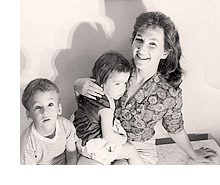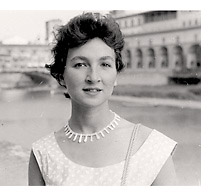 |



 Anna Lipworth was an indiscriminate lover of the human race. In a world increasingly riven by hatred and the petty quarrels of politics and faith, Anna roved like a mercenary peacemaker who could see a trace of divine in a weed or the lowliest of men. Her hopes for a more just and humane society were never depleted. She was a creative, questing soul whose love of art, poetry and philosophy knew no boundaries. On her cluttered coffee table would be books on topics as diverse as elm trees and mysticism. Anna Lipworth was an indiscriminate lover of the human race. In a world increasingly riven by hatred and the petty quarrels of politics and faith, Anna roved like a mercenary peacemaker who could see a trace of divine in a weed or the lowliest of men. Her hopes for a more just and humane society were never depleted. She was a creative, questing soul whose love of art, poetry and philosophy knew no boundaries. On her cluttered coffee table would be books on topics as diverse as elm trees and mysticism.
 Anna's life spanned continents and cultures. She was born in the Bronx, to parents who emigrated from Russia. She studied at City College, then a
cauldron of progressive politics, and graduated with a degree in clinical
psychology. She joined the Ethical Culture Society, where she found herself
among kindred spirits steeped in the heady intellectual bohemianism of the
late 1950s. Her love of the arts led her to study modern dance with Martha
Graham and oil painting at the Art Students League in New York and with
the Hans Hoffman Studios in Provincetown. At a graduate student party on the Upper
West Side she met a young physicist from South Africa named Edgar Lipworth, then a
student at Columbia. The couple married. Anna's life spanned continents and cultures. She was born in the Bronx, to parents who emigrated from Russia. She studied at City College, then a
cauldron of progressive politics, and graduated with a degree in clinical
psychology. She joined the Ethical Culture Society, where she found herself
among kindred spirits steeped in the heady intellectual bohemianism of the
late 1950s. Her love of the arts led her to study modern dance with Martha
Graham and oil painting at the Art Students League in New York and with
the Hans Hoffman Studios in Provincetown. At a graduate student party on the Upper
West Side she met a young physicist from South Africa named Edgar Lipworth, then a
student at Columbia. The couple married.
Anna's spirit blossomed in the 1960s, a decade that matched her optimism and bright hope for humanity. She
gave birth to two children, David and Vara. The family moved to Massachusetts,
when her husband accepted a teaching position at Brandeis University.
Anna spent many years in different parts of Newton, most
happily and in the end in a small apartment overlooking her beloved Crystal Lake.
"In Rembrandt," Anna Lipworth wrote, "the background and the figure are one and the same. Everything is interesting: the viewer does not separate anything, as in a beautiful view offered by nature in which everything contributes to enchant the viewer."
"When I paint it is as though I am becoming in touch with an inner source of alchemy. The canvas subtly shifts and changes as the harmony of form comes into being. The process begins with a feeling that needs to be thrust out, like a mass of convergent energy waiting to be released. Form becomes elicited from the canvas ... the story of the painting begins to appear. When it is completed, it becomes apparent that the painting itself has transformed; paintings go through many phases of birth, death and resurrection."
Exhibits
1991 |
Rose Art Museum, Brandeis University, Waltham, Mass. One of Ms. Lipworth's paintings, "Heavenly Days", purchased for permanent collection
|
1991 |
DeHaviland Gallery of Fine Arts, Newbury St, Boston, Mass
 |
1991 |
Wellesley Health Association Medical Clinic, paintings related to the art of well-being
 |
1991 |
Interface Gallery of Arts, Newton, Mass
 |
1990 |
"An Artist's Vision", one-woman show, Newton Art Center, Newton, Mass
 |
1989 |
"The Broken Home" painting exhibited at Mayor's offices, city tricentennial, Newton, Mass
 |
1985 |
Whitney Portland Art Museum, Portland, Maine
 |
1984 |
Svedenborg Gallery, Newbury St, Boston, Mass (covered by WCVB TV)
 |
1982 |
Salon des Artistes, Meridien Hotel, Franklin St, Boston, Mass
 |
1980 |
Wellesley Gallery of Art, Wellesley, Mass
 |
1975 |
Tiena Karlis Gallery, Provincetown, Mass
 |
Education
MFA, Brandeis University, Waltham, Mass
 |
MA (Psychology and Fine Arts), City University of New York
 |
Ms. Lipworth also studied at the Art Students League (NY), University of California at Berkeley, modern dance at the Martha Graham Studios (NY); also studied for many years on Provincetown, including with Hans Hoffman's student, Morris Davidson.
 |
|

 Anna Lipworth was an indiscriminate lover
Anna Lipworth was an indiscriminate lover Anna's life spanned continents and cultures. She was born in the Bronx, to parents who emigrated from Russia. She studied at City College, then a
cauldron of progressive politics, and graduated with a degree in clinical
psychology. She joined the Ethical Culture Society, where she found herself
among kindred spirits steeped in the heady intellectual bohemianism of the
late 1950s. Her love of the arts led her to study modern dance with Martha
Graham and oil painting at the Art Students League in New York and with
the Hans Hoffman Studios in Provincetown. At a graduate student party on the Upper
West Side she met a young physicist from South Africa named Edgar Lipworth, then a
student at Columbia. The couple married.
Anna's life spanned continents and cultures. She was born in the Bronx, to parents who emigrated from Russia. She studied at City College, then a
cauldron of progressive politics, and graduated with a degree in clinical
psychology. She joined the Ethical Culture Society, where she found herself
among kindred spirits steeped in the heady intellectual bohemianism of the
late 1950s. Her love of the arts led her to study modern dance with Martha
Graham and oil painting at the Art Students League in New York and with
the Hans Hoffman Studios in Provincetown. At a graduate student party on the Upper
West Side she met a young physicist from South Africa named Edgar Lipworth, then a
student at Columbia. The couple married.